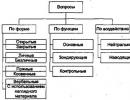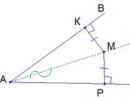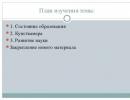What is jargon and why does it occur? An example of jargon in modern life. The origin of the word slang How jargon appeared
The concept of "slang" is beginning to attract the attention of modern philologists more and more. Today there are a fairly large number of definitions of the word "slang", which often contradict each other. First of all, these contradictions are related to the scope of the concept itself: the dispute, in particular, is whether to include in slang only ironic, expressive words-synonyms of literary equivalents, or also all vocabulary that does not meet the standards of the literary language, the use of which is condemned in the circle educated people.
Objective of the project
Find out what slang is, when slang appeared, what are the history of development and the origins of slang.
Project objectives
- What is slang?
- Where did the first slang come from?
- What is the history of the development of slang?
- When did teenagers start using slang?
§1 Definition of slang
Consider some of the many definitions of slang. In Russian linguistics, the definition of V. A. Khomyakov is most often used:
« slang- this is a relatively stable for a certain period, widely used, stylistically marked (reduced) lexical layer (nouns, adjectives and verbs denoting everyday phenomena, objects, processes and signs), a component of expressive vernacular, included in literary language, very heterogeneous in its origins, the degree of approximation to the literary standard, with pejorative expression "
With the point of view of B. A. Khomyakova, O. S. Akhmanova partially agrees. She offers the following interpretation of slang: “slang is:
A) colloquial version of professional speech; b) elements of the colloquial variant of a particular professional or social group, which, penetrating into the literary language or into the speech of people who are not directly related to this group of people, acquire a special emotional and expressive coloring in these languages”
§2 Origin of the word slang
The history of the word and the formation of its meaning
In one of his books, V. A. Khomyakov pointed out that the term "slang" in the sense of "language of a low or vulgar type" was first used in 1756
year.
FROM 1802
years, this word is understood as "kent - jargon of a certain class or period",
A with 1818
years, slang began to be understood as "a language of a high colloquial type, lower to the level of a standard enlightened language, consisting of new words, or words that are used in a certain sense."
The term is slang for about half XX century began to have a modern meaning, while this term until 1850
years denoted vulgar speech with the exception of the language kent(a special language of gypsies, thieves and other people that they used so that others would not understand them).
According to A. Lipatov, in England “slang existed already in XIV century, however, this speech phenomenon itself was known under other names, and most often as Kent.
IN 1788
In the year Francis Grose introduced the term "slang" as a synonym for the word "cant" in his dictionary of "vulgar" language.
Often, over time, linguists interpreted the terms in the same way, in other words, they used them “interspersed with each other”, which led to the fact that “Kent, losing more and more its speech and lexical positions, dissolved in slang”.
Origin of the word
IN modern linguistics until now, as you know, there are doubts about the origin of the word "slang". According to one version, the English `slang" comes from `sling" (to throw, throw).
There is also a version that the slang goes back to `slanguage". Moreover, the initial `s" was supposedly added to `language" as a result of the disappearance of the word `thieves", that is, the thieves' speech "thieves" language" was originally meant.
§3 History of Russian youth slang
In the course of working on the topic, we found out that the origins of Russian slang lie in the school jargon of the middle XIX century, when the creation of isolation in closed educational institutions led to the formation of a peculiar vocabulary. He gave the first name to youth jargon N.V. Gogol, calling it "the technical word".
Modern youth slang began its history at the beginning of the 20th century:
Early 20th century
The general decline in morals during revolutions and civil war sharply increased the proportion of slang among young people. In addition, the children of the lumpen proletarians, homeless children who went through all the evil of that time, came to the school. Apparently, it was at this time that slang was significantly replenished with thieves' vocabulary. Here are her examples:
Squeeze- to steal
roll on- complain
Sculpt humpback- pretend
Stand on the lookout- guard, protect
Shamovka- food.
1940s
The post-war youth had little pronounced slang. Words were borrowed from the army language (for example, polundra - a signal of danger) and from the jargon of criminals:
kodla- company,
Boilers- clock,
crusts- boots,
tyrit- to steal
Shukher- guard post.
Here's how they sang in the early 50s:
Fishing by the river
Someone stole the shoes.
I didn't steal, I didn't take
I was on the cusp.
1960s
Slang was noticeably enriched and updated in the late 1950s, when the so-called dudes appeared. Along with their special fashion (tight trousers, plaid jackets, colorful ties, boots with thick rubber soles), the dudes brought their own slang, partly borrowed from foreign languages, partly - from the musical environment, partly - from nowhere.
Dude, dude- a guy, a girl who are their own in a stylish company,
Ford- a place for evening walks (from Broadway),
Heal- go for a walk,
crap- nonsense, lies.
From the folklore of the time:
Used to listen to Bach fugues
And now I'm boogie.
1970s
Time of mass study of foreign languages. During these years, the hippie youth movement came to us. Many foreign (especially English) words have penetrated into the Russian language. Of course, this could not but affect the slang.
Gerla- girl, diminutive - gerlenysh,
Trusera- trousers, pants,
Khairty- long-haired young man, hippie,
Shuzniak- any footwear
session- party,
hippie- behave independently, neglecting the general rules.
Boris Grebenshchikov's play "In the arms of jeans" was written on such slang.
An anecdote from that time:
"The old woman asks the young man:
- Young man, help me cross to the other side of the street.
- Firstly, not a young man, but a hairy one, and secondly, not to cross to the other side of the street, but to throw the bones to the other side. And thirdly, ask for a whistler, - points to the guard.
The old woman is like a sentry:
- Whistler, help throw the bones to the other side.
- Are you hippie, stick? .. "
1980-90s
This is a transitional period, when the internal processes of the collapse of Soviet society have already gone too far. Because the slang of this time is mixed - partly it belongs to the old Soviet way of thinking, partly - to the coming times of change. There are gaming - professional cheaters, bombers and carp- street robbers from youth gangs. With the beginning of perestroika, purely concrete ones appear that do not yet need translation. cool, sucker, scammer, disassembly, grandmas.
conclusions
Slang – social variety speech used by people united by a commonality of interests, habits, occupations, social status. The history of youth jargon goes back not only hundreds, but thousands of years. In writing, the word "slang" was first recorded in England in XXVIII century. The term "slang" in the sense of "language of a low or vulgar type" was first used in 1756. The origins of Russian slang lie in the school jargon of the middle XIX century. Modern youth slang began its history at the beginning of the 20th century.
Sources
- Explanatory dictionary of Russian slang, Vladimir Elistratov, 2010
- Basics of English slang and business correspondence, Goldenkov Mikhail Anatolyevich, 1994
- Standard variants of the Slavic languages, Alexander Birich, 2009
- Professional jargon in the speech of representatives of different professions, Tverdokhleb O.G.
The same goes for borrowing words. For example, the word "hi" is shorter and simpler words“hello”, and the word “good” is happy to replace approval (good, excellent, great, great). It is noteworthy that most of the newly formed slang words over time are so tightly integrated into general speech that become ordinary words, losing the status of jargon.
Professional area
The professional sphere includes jargon that arises on the basis of the characteristics of a particular profession, as well as words that appear in schools, universities and prisons. As a rule, someone comes up with a new word, and people in his social circle begin to use this word. Thus, a whole section of the language appears that needs translation for those who have never encountered it.For example, programmers have their own jargon, which is a mixture of technical English and Russian (“bug”, “bot”, “dos”, etc.). Among drivers, there are expressions like “turn the wheel”, “carried”, “bombed”, “nine”, “six”, etc. Schoolchildren love the words "teacher", "unsuccessful", etc. Students add to them the expressions "", "points", "", "nerd", etc.
Especially different from other criminal jargon, which includes more than a dozen words and expressions that are incomprehensible ordinary person.
Also, new words and expressions appear in certain groups of people united by some common cause. For example, in the army ("spirits", "demobilization", "AWOL").
Immigration
Many jargons arise due to the migration of peoples. When one nationality merges into another, languages are mixed and new words are obtained that are used only in certain situations. As a rule, such words are modified according to the rules not of the language of their origin, but of the language of immigrants. This is how the jargons “be happy”, “get connected”, etc. appeared.How did slang (jargon) appear?
Slang, or jargon, is a variation or modification of a standard language. If you look closely, you can find different types of jargon.
For example, slang can be created by combining several words, for example, scab, shortening words (mike, ok), onomatopoeia (boom, fuck), borrowing from foreign languages (samurai, driver), and also by analogy (sew, take away ).
Different types of jargon arise for different reasons and under different conditions. One of the common ways is the emergence of new words and phrases in one professional group. For example, students say "unsuccessful", "spur". Motorists call their cars "four", "nine".
But it should be remembered that often slang words used by one group may have a different meaning in other groups. Some conditions accelerate the emergence of new words. For example, the formation of new groups containing different segments of the population and representatives of different nationalities leads to the rapid emergence of new slang. As, for example, in the armed forces: "woki-toki", "AWOL", "demobilization".
Sometimes a new word comes up with one person, and it is picked up by the rest. In most cases, new expressions that were once related to slang eventually find their way into dictionaries.
The etymology of the word "slang" is one of the most controversial and confusing issues in English lexicography. The difficulty lies in the fact that it is extremely difficult to determine the time of its appearance.
Slang as such was probably born with the advent of human society, that is, when social stratification and professional affiliation arose, when there was a need for communication that was incomprehensible to outsiders. Slang arose as a special language designed for specific purposes, and remains so to this day. It is hardly possible to determine even the approximate date of its appearance, but we cannot doubt that it has existed since ancient times.
Initially, there was no division into slang, jargon, and slang. All this was a single whole for a long time. But over time, these words began to denote specific concepts that are different from each other. Their differentiation occurred much later than the appearance of the special language.
There are still doubts about the origin of the word "slang". As is known, this English word slang. According to one version, it comes from the verb to sling, which means “to throw”, “throw”. This verb was used in the expression to sling one's jaw, which means "to speak insulting speech." Knowing the expressive nature of slang, as well as the familiarity that is often inherent in it, we find in this hypothesis a certain grain of truth. According to another existing version, slang goes back to slanguage, a word that appeared as a result of the partial disappearance of the word thieves in the phrase thieves' language. That is, the word slang originally meant thieves' language. Therefore, probably, slang has long been synonymous with the word "argo". This version seems to us more plausible, because the definition of the word "slang" as a thieves' language is in many ways close to its modern meaning.
When the word "slang" appeared in England is not known for certain. In writing, it first appears in the 18th century. Then it meant "insult". Presumably in 1850, this word expanded its meaning and began to denote colloquial vocabulary. At about the same time, synonyms for the word slang appeared, namely lingo and argot. Since then, the meaning of this word has expanded significantly and has come to mean a whole layer of vocabulary.
For a long time, various hypotheses of the origin and purpose of slang have been put forward. It was considered both as the language of the lower strata of society, and as a gypsy language, and as a reflection of one of the Scandinavian languages. Theories of this kind still arise today, some are scientifically sound, while others are not. But the essence of slang does not change from this. It was and remains a completely unique, constantly evolving part of the language, without which modern language already unthinkable.






